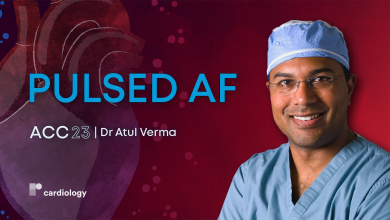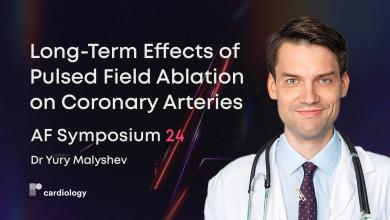Search results
Optimizing Cryoballoon Ablation
Author(s):
Andreas Metzner
,
Serge Boveda
,
Tarv Dhanjal
Start date:
Jan 14, 2020
Broadcast
Author(s):
Mario Njeim
,
Frank Bogun
Added:
3 years ago
Percutaneous ablation for ventricular tachycardia (VT) was first attempted in 1983 and has rapidly evolved to become an important option for controlling recurrent VTs.1 Endocardial ablation remained the only percutaneous approach until epicardial access was introduced by Sosa et al. in 1996 and thereafter became progressively more available as an adjunctive strategy for the treatment of…
View more
Author(s):
Atul Verma
Added:
1 year ago
ACC.23/WCC - Principal Investigator, DrAtul Verma (McGill University Health Centre, CA) joins us on-site at ACC's 2023 Scientific Sessions to outline the findings of the PULSED-AF Trial(Medtronic Cardiac Rhythm and Heart Failure) (NCT04198701).
In this prospective, multicenter study, 421 patients with persistent atrial fibrillation (AF) were treated with the Medtronic PulseSelect Pulsed Field…
View more
Author(s):
Daniele Muser
,
Simon A Castro
,
Jackson J Liang
,
et al
Added:
3 years ago
The role of catheter ablation (CA) in the management of ventricular tachycardia (VT) is becoming increasingly relevant, having repeatedly shown its superiority to medical therapy in reducing the arrhythmic burden, thus improving prognosis and quality of life in patients with structural heart disease presenting with VT.1–4 In such patients, recurrent VT and heart failure (HF) status are connected…
View more
Author(s):
Serge Boveda
,
Andreu Porta-Sánchez
Added:
1 year ago
In this short video from Arrhythmia Academy's Journal Club, Dr Serge Boveda (Clinique Pasteur Toulouse, FR) and Dr Andreu Porta-Sanchez (Hospital Clínic de Barcelona, ES) discuss the key elements that must be considered in pre-procedural planning for pulsed-field ablation.
Discussion Points Include:
What is the pre-procedural planning needed for PFA?
Can it be done without general anaesthesia?…
View more
Author(s):
Vincent Umbrain
,
Christian Verborgh
,
Gian-Battista Chierchia
,
et al
Added:
3 years ago
The current option for refractory treatment for atrial fibrillation (AF) includes hybrid AF-surgery.1–2 The hybrid approach was originally a combination of mini-invasive surgical epicardial evaluation and ablation, as well as endocardial electrophysiologist (EP) catheter ablation with the intention of creating a lesion set to cure AF.3 In the search for greater efficacy with less patient…
View more
Author(s):
Yoga Waranugraha
,
Ardian Rizal
,
Mohammad Saifur Rohman
,
et al
Added:
1 year ago
Author(s):
Sunil Kapur
,
Moussa Mansour
Added:
3 years ago
Atrial fibrillation (AF) is the most common cardiac arrhythmia, affecting more than three million Americans.1 The management of AF revolves around the alleviation of symptoms related to an accelerated and irregular ventricular response, and the prevention of cardioembolism, notably stroke. In patients with AF, there is a fivefold increased incidence of embolic stroke.2 The prevention of systemic…
View more
ICE in LAAO
Author(s):
Juan Carlos Diaz
,
Mauricio Duque
,
Jorge Marin
,
et al
Added:
1 month ago
Article
Author(s):
Yury Malyshev
Added:
2 months ago
AF Symposium 24 — Dr Yury Malyshev (Mount Sinai Hospital, US) joins us to discuss the findings from three studies focusing on the long-term effects of pulsed-field ablation (PFA) on coronary arteries.QuestionsWhat is known currently about the effect of PFA in Coronary Arteries? What is the importance of this topic?What was the study design and cohort?What are the key findings?Who are the take…
View more
















 « First
« First